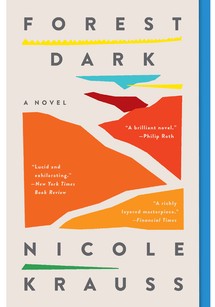In Nicole Krauss's philosophically rich novel, the
goal is metamorphosis and meaning.
Forest Dark takes its title from
The Inferno, wherein Dante finds himself in murky woods
because "the straightforward pathway had been lost."
In alternating chapters, Nicole Krauss gives us dual
protagonists who have abandoned their own once-clear roads. Jules, a wealthy
68-year-old Manhattan attorney and savant, startles his family by divesting
himself of his law partnership and selling off all his possessions, including
his vast art collection. He abruptly leaves for Israel to find a memorial site
for his parents and investigate this question: "What else was there still
to learn about himself?" Nicole, a lauded but blocked novelist, has left
her young sons and a foundering marriage in Brooklyn to take up residence in
the Tel Aviv Hilton, where she was conceived, convinced it's the only place she
can rekindle her creative spark.
Whether the two ever cross paths—or even inhabit the same
plane of reality—is open to interpretation; Krauss resists easy resolution as
deftly as she eschews traditional plot. But what the characters do have in
common is a sense, as Nicole puts it, that in their lives "the degree of
artifice was greater than the degree of truth." Can their sojourns shift
that balance? At first, the answer appears to be no: In the course of their
parallel adventures, existential confusion only deepens, until they find
themselves literally lost in the desert.
The author, who shares some of her heroine's biographical
circumstances, started as a poet, which may explain why she writes insight and
revelation better than just about anyone working today. Her handling of
domestic entropy is uniquely devastating and invites readers to draw
comparisons to her real-life divorce from writer Jonathan Safran Foer.
Krauss isn't the first novelist to embed herself in her own
work: Philip Roth notably played with the device in the novels
Deception and
Operation Shylock, and Foer's
2016
Here I Am contains what appear to be autobiographical
elements, among them a painful breakup. Such self-reference can read as clever
or meta, but in Krauss's hands it feels like radical honesty, personal and
searing.
While Krauss's genius has long been evident, of her four
books this one cuts closest to the bone. The woods may be dark, but Krauss's
gorgeous sentences light our way through.


